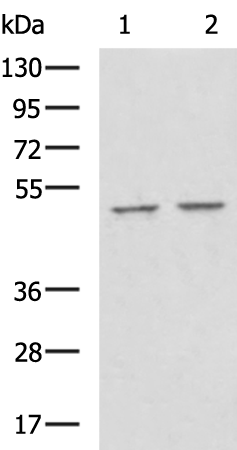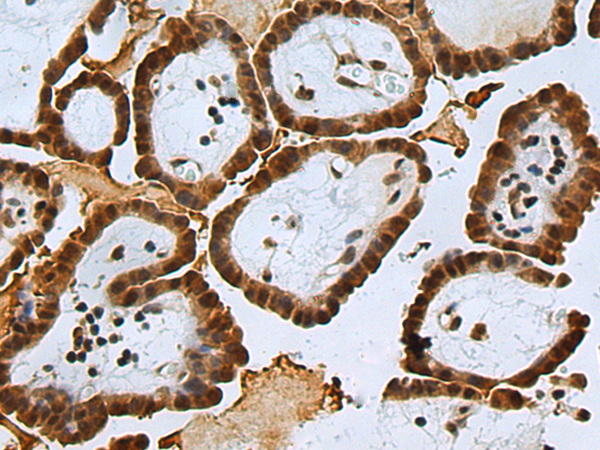

| WB | 咨询技术 | Human,Mouse,Rat |
| IF | 咨询技术 | Human,Mouse,Rat |
| IHC | 1/100-1/300 | Human,Mouse,Rat |
| ICC | 技术咨询 | Human,Mouse,Rat |
| FCM | 咨询技术 | Human,Mouse,Rat |
| Elisa | 1/5000-1/10000 | Human,Mouse,Rat |
| Aliases | NER; UNR; LXRB; LXR-b; NER-I; RIP15 |
| WB Predicted band size | 51 kDa |
| Host/Isotype | Rabbit IgG |
| Antibody Type | Primary antibody |
| Storage | Store at 4°C short term. Aliquot and store at -20°C long term. Avoid freeze/thaw cycles. |
| Species Reactivity | Human, Mouse, Rat |
| Immunogen | Fusion protein of human NR1H2 |
| Formulation | Purified antibody in PBS with 0.05% sodium azide and 50% glycerol. |
+ +
以下是关于NR1H2(LXRβ)抗体的3篇参考文献示例(注:部分文献信息为示例性描述,实际引用需核实原文):
---
1. **文献名称**:*"Liver X receptor β (LXRβ) regulates cholesterol homeostasis in a cell-type-specific manner"*
**作者**:Venkateswaran A, et al.
**摘要**:本研究通过Western blot和免疫荧光技术,利用NR1H2特异性抗体揭示了LXRβ在不同细胞类型中对胆固醇代谢的调控差异,强调了其在巨噬细胞中的抗动脉粥样硬化作用。
---
2. **文献名称**:*"Anti-inflammatory effects of LXRβ in macrophages: Insights from genetic and antibody-based approaches"*
**作者**:Joseph SB, et al.
**摘要**:作者通过NR1H2抗体进行免疫共沉淀和流式细胞术,证明LXRβ通过抑制NF-κB通路减轻炎症反应,为靶向LXRβ治疗炎症性疾病提供了实验依据。
---
3. **文献名称**:*"Tissue-specific expression profiling of nuclear receptors using validated antibodies"*
**作者**:Peet DJ, et al.
**摘要**:该研究系统验证了包括NR1H2抗体在内的多种核受体抗体的特异性,并通过免疫组化揭示了LXRβ在肝脏和脑组织中的差异表达模式,强调了抗体选择对结果准确性的重要性。
---
**提示**:实际研究中,建议通过PubMed或抗体供应商(如Abcam、CST)提供的产品引用链接获取准确文献。部分公司(如Santa Cruz Biotechnology)可能直接列出抗体应用文献(e.g., sc-130455 NR1H2抗体相关论文)。
The NR1H2 antibody is a crucial tool for studying the nuclear receptor subfamily 1. group H, member 2 (NR1H2), also known as liver X receptor beta (LXRβ). NR1H2 is a ligand-activated transcription factor that regulates gene expression by binding to specific DNA response elements, often forming heterodimers with retinoid X receptors (RXRs). It plays a pivotal role in lipid metabolism, cholesterol homeostasis, and inflammation by responding to oxysterols, its natural ligands. Research links NR1H2 to diseases such as atherosclerosis, diabetes, and cancer, making it a therapeutic target.
The NR1H2 antibody is widely used in molecular and cellular biology to detect and quantify NR1H2 protein levels in tissues or cells via techniques like Western blotting, immunohistochemistry, and immunofluorescence. It aids in exploring NR1H2's subcellular localization, expression patterns, and interactions with co-regulators. Validated antibodies ensure specificity for distinguishing NR1H2 from its isoform LXRα (NR1H3), which shares functional overlap but has distinct tissue distributions.
Studies utilizing NR1H2 antibodies have advanced understanding of its role in metabolic disorders and immune responses. For example, they help elucidate how NR1H2 modulates reverse cholesterol transport or suppresses inflammatory pathways. Commercial antibodies often come with validation data (e.g., knockout controls), ensuring reliability. Continued development of high-affinity NR1H2 antibodies supports drug discovery and mechanistic studies targeting LXR signaling pathways.
×